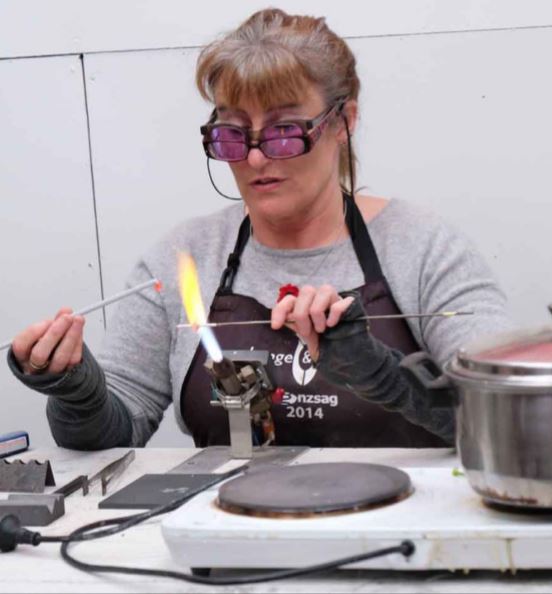Jo came to Business Mentors looking to increase her sales. With the help of her mentor, Bryan Winters, Jo changed her workshops from educational classes into “glass-making experiences”. This doubled her income in the past year. Half of Jo’s business is now dedicated to her glassmaking workshop experiences, while the other half is spent making her own creations for sale throughout New Zealand.
Turning her workshops from educational classes into “glass-making experiences” has doubled Tauranga glassmaker Jo Tricker’s income in the past year.
For the previous five years Jo had been “propping up” her Jo Tricker Glass business with funds from a property sale eight years earlier.
“I wasn’t even breaking even, but I realised I couldn’t go dipping into my own funds forever,” she says.
Sixteen months after seeking support through Business Mentors New Zealand, Jo’s educational workshops have evolved into internet-promoted glassmaking “experiences” offering guests more than just a learning workshop.
“Some people come to a workshop and their sole reason is to learn and get some skills and go away and do it again, while others just want to come and enjoy the experience,” Jo says. “They may never do it again.”
Jo feels she has finally turned a corner.
“In October last year I was still questioning myself. Now I feel like my business has the potential to be something,” she says.
She attributes that turnaround to a combination of new ideas, advice and support from her business mentor Bryan Winters, alongside her own determination to succeed and willingness to embrace new ways of thinking.
Jo is one of many hundreds of New Zealanders who, on turning their passions and hobbies into a business, are then faced with the reality of how to run that business successfully.
There are over 500,000 small-to-medium businesses (SMEs) in New Zealand with 850 new start-ups every month. Of those start-ups, research shows that 30% are doomed to fail within two years, with isolation cited as one of the main reasons.
Jo says she appreciated having Bryan’s unbiased support.
“When I met up with Bryan, I was looking to increase my sales, but I also needed someone to be realistic. One of the first things Bryan said to me was that if it didn’t work out, I needed to have an exit plan.
“I remember thinking at the time that I really did want this to work out, so it was almost a psychological turning point that made me look realistically at what I was doing and how to make it sustainable.”
Jo says small business owners need to have someone to talk to outside their circle of friends and family so they can front up to what they are doing and the possibility that it might not work out.
“I think a lot of people are told that by friends and family, but they don’t want to hear it.”
Like many SMEs, Jo Tricker Glass became a business by default when her “hobby” outgrew her garage.
“I didn’t have the intention of starting a business – I just needed space to impart my technical ability,” she says. “I started up my business because of my passion, but I had no business experience whatsoever.”
Jo says having Bryan to reassure her that she could learn those necessary business skills was invaluable.
“But you need to be willing to be open to other ideas and also to the fact that you might fail,” she says.
So, when Bryan suggested marketing her classes as “experiences” rather than lessons, Jo took the opportunity to challenge the norm.
Bryan says while the process to get to where Jo is now sounds simple, it took nine to 10 months for her to shift her thinking patterns.
“We were firing shots in various directions, but eventually it became easier to sell the experience rather than the product.”
Once Jo listed her workshops online as experiences, he says the bookings started almost immediately.
“I was as surprised as her, but it doesn’t matter, it worked.”
Half of Jo’s business is now dedicated to her glassmaking workshop experiences, while the other half is spent making her own creations for sale throughout New Zealand.
Jo’s three key takeaway tips for start-ups:
• Don’t underestimate how much money you will need to get you from zero to sustainability. Work out how much you think you will need for a year - then triple it? then times that by 5 to 6 years - and that will give you the amount you need to get your business going. Most businesses I talk to - no matter what the industry - seem to turn a corner at the fifth or sixth year.
• Be prepared for a long and sometimes lonely journey - not everyone will believe in what you are doing - sometimes even family. It is hard knacker - you need oodles of resilience, a great work ethic and buckets of self-belief!
• Don’t lose your passion - that is what got you started. Do what you love and love what you do - and never lose sight of that!






.png)
